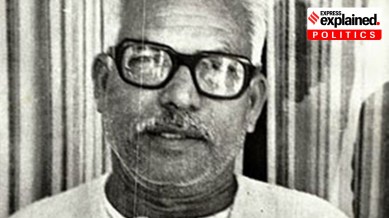Prominent political parties of Bihar, such as the RJD and the JD(U), have regularly demanded the Bharat Ratna for Thakur, known for his struggle to secure dignity, self respect, and development for the most disadvantaged sections of society.
Thakur’s (January 24, 1924-February 17, 1988) political life was one of contrasts — he managed to emerge as the tallest backward caste leader in Bihar despite belonging to the minority nai (barber) caste himself, but the rise of the leaders he mentored, from numerically stronger castes (Lalu Prasad from the Yadavs, Ram Vilas Paswan among Dalits), took away his pole position. He was chief minister twice for short tenures, but his radical policy decisions had an outsized impact, and resonate even today.
Life and career
Thakur was born in village Pitaunjhia (now known as Karpoori Gram), in the Samastipur district of Bihar. He participated in the freedom struggle and was also jailed for it. In independent India, he was voted in as an MLA in 1952. He remained an MLA till his death in 1988, except when he became an MP in 1977 and when he lost an Assembly election in 1984, amid the sympathy wave for Congress after Indira Gandhi’s assassination.
Thakur was education minister of Bihar from March 5 1967 to January 28, 1968. He became the state’s chief minister in December 1970 with the Samyukta Socialist Party, but his government fell after six months. He came to the post again in June 1977, but could not finish a full term, losing power in about two years. This happened due to a reservation policy he implemented, on which we’ll elaborate later.
As a new crop of social justice leaders became more powerful in Bihar, Thakur slowly lost the pre-eminence he had enjoyed.
Story continues below this ad
While his policy decisions were polarising, he was respected personally for his clean image and his refusal to enrich himself on government funds.
A popular anecdote about him is that when he first became an MLA in 1952, he was selected for an official delegation to Austria. He did not own a coat, and had to borrow a torn one from a friend. When Josip Tito, the president of Yugoslavia, noticed the torn coat, he gifted Thakur a new one. When Thakur died in 1988, after three decades in public life, his home was little more than a hut.
Major policy decisions
Thakur is known for many of his decisions — removing English as compulsory subject for the matriculation examinations; prohibition of alcohol; preferential treatment for unemployed engineers in government contracts, through which around 8,000 of them got jobs (this was when unemployed engineers were staging regular protests for jobs; one such protester was Nitish Kumar); and a layered reservation system.
It was this last move that went on to have the loudest impact for Bihar as well as the country.
Story continues below this ad
In June 1970, the Bihar government appointed the Mungeri Lal Commission, which in its report of February 1976 named 128 “backward” communities, 94 of which were identified as “most backward”. The Janata Party government of Thakur implemented the recommendations of the Commission. The ‘Karpoori Thakur Formula’ provided 26% reservation, of which OBCs got a 12% share, the economically backward classes among the OBCs got 8%, women got 3%, and the poor from the “upper castes” got 3%.
This was much before the central government came up with the EWS quota, and demands of layered reservation gained momentum amid caste census demands.
In the short term, however, The ‘Karpoori Thakur Formula’ cost him dearly. His government fell, and he witnessed major opposition from upper castes. Jayant Jigyasu, national spokesperson of the RJD, told The Indian Express, “After the landmark reservation policy was passed, Thakur had to face derogatory and even abusive slogans from the upper castes, directly targeting his caste. One such went ‘Karpoori kar poora, chhod gaddi, dhar ustura (Finish your work, Karpuri. Step off the chair, go hold a razor)’, a reference to his caste’s traditional occupation of a barber. A point to be noted is that this venom came his way even though he faced no charges of personal corruption or ‘lawlessness’ during his tenure.”
Politically too, his decision of bringing in the reservation policy has been seen as hasty. Jagpal Singh, former professor at IGNOU, in a 2013 paper contrasted Thakur’s way of working with Devaraj Urs of Karnataka: “Unlike Karpoori Thakur, Urs introduced the reservation policy during the last two years of his seven years of rule, after having consolidated his position for most of his rule. About the lack of proper preparation on the part of Karpoori Thakur, Urs remarked, “Karpoori Thakur climbed into the ring before he learned how to box”,” Singh wrote.
Story continues below this ad
However, Thakur did keep his promise to his core voters, irrespective of the consequences.
Karpoori Thakur today
As the Mandal-Kamandal politics intensifies, Thakur’s legacy is being claimed by all political players in Bihar. CM Nitish Kumar, himself from a numerically small EBC community, has specialy sought to identify closely with Thakur.
Some have pointed out the irony of this, as it was Nitish’s generation of leaders that sidelined Thakur. To this, Jigyasu said, “The BJP government is honouring Thakur today, but it’s important to remember that his government fell because the Sangh-affiliated sections of the Janata Party withdrew support for him. The RJD and JD(U), meanwhile, are carrying his legacy forward through the government’s policies.”
